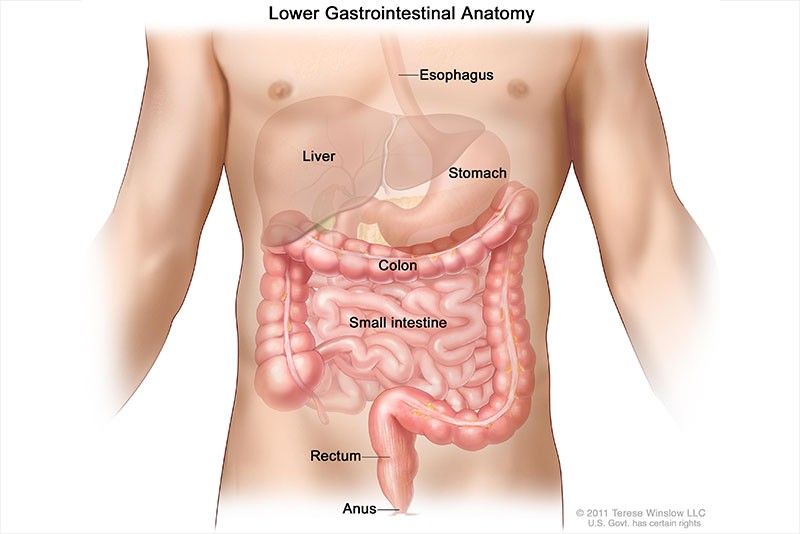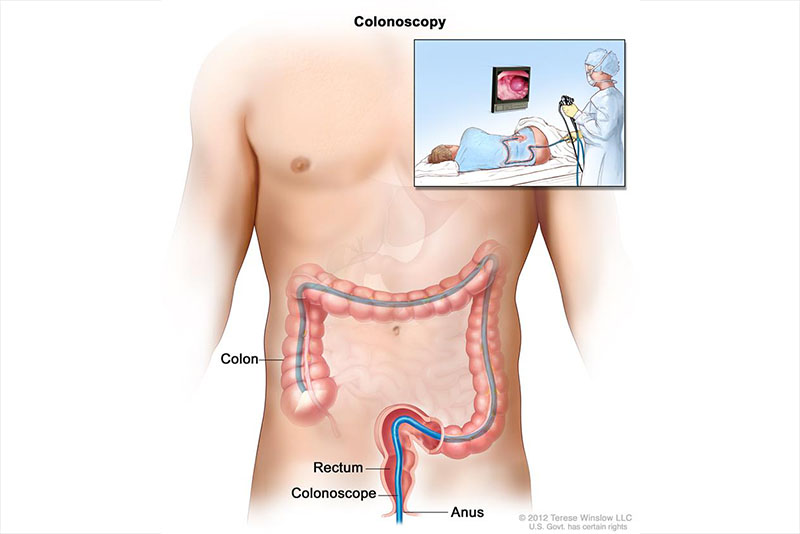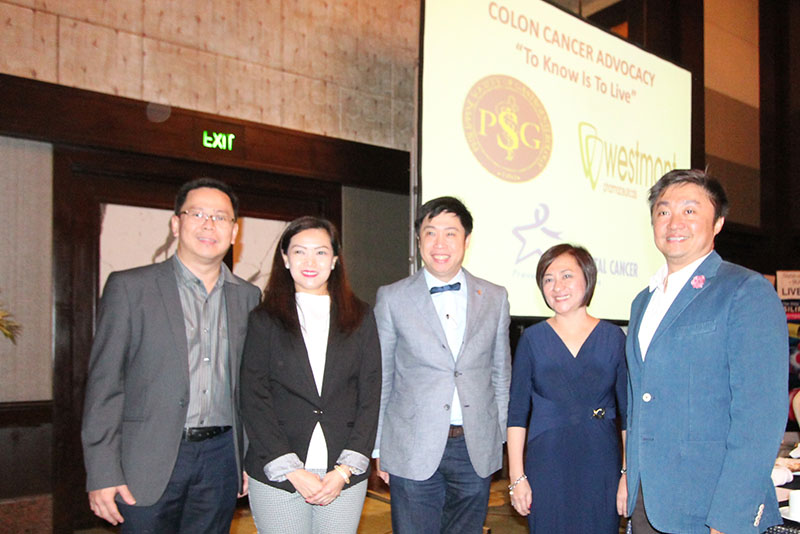Colorectal cancer now Philippines' number 1 cancer

MANILA, Philippines — Colorectal cancer is the number one gastrointestinal cancer in the Philippines, overtaking liver cancer, an expert said.
"Over the past years, we thought, in the GI (gastrointestinal) tract, the liver is supposed to be the number one cancer in the Philippines…But right now, it has been overtaken by colorectal (CRC) cancer," Dr. Frederick Dy, president of Philippine Society of Gastroenterology (PSG), recently declared at a news conference marking March as Colon and Rectal Cancer Awareness Month.
Dy said colorectal cancer is actually preventable "because it doesn't just grow, it has precursor lesions we call as ‘polyps' and these polyps, if left unattended overtime, can become malignant.
PSG's recent data shows that there are over 3,000 new cases of CRC among Filipinos annually. Of these more than 3,000, over 2,000 die, said Dy, and these are only based on reported cases.
Just last year, a global research even found out that the Philippines has the highest increase in mortality among the 37 countries surveyed, Dy noted. This means, he said, that CRC patients in the Philippines die faster than those in other countries.
"If we know this statistics, we can actually prevent the cancer because we have the expertise to remove this polyp…We just lack a screening program in the Philippines," he fretted.
What is colorectal cancer?
Dy explained that every cancer starts with a polyp or in Tagalog, "kuntil." There are different types of polyp, but the dangerous one is an adenoma, which can progress to cancer.
The colon or large intestine, according to PSG first vice president Dr. Judith Gapasin-Tongco, extends up to the rectum. If the malignant tumor or tumors grow anywhere from the colon to the rectum, then it is called colorectal cancer.

The US' National Cancer Institute's illustration of the colon and colonoscopy. National Cancer Institute/File
Facts about the colon
- It can take anywhere from 12 to 48 hours of food to completely pass through your colon, according to Mayo Clinic, as cited by a MMC report.
- The National Cancer Institute noted that colons are host to countless numbers of microorganisms known as microbiota, majority of which are bacteria. The identification of the role of the microbiota has led to the popularity of the use of probiotics as supplements and food additives to enhance digestive health and immune system functioning.
- The University of the Chicago, said MMC, explained that humans can survive without their colon. In fact, total colectomy or large intestine removal can be used to treat colon or rectal cancer.
Risk factors for CRC
Colon cancer, said Dr. Gapasin-Tongco, can occur to both men and women regardless of their social status and educational attainment.
Dy, however, noted that it is more common among men than women because of men's lifestyle. Women, he said, generally eat more vegetables than men.
Here are the other usual causes.
1. Age
Those 50 and up have a higher risk of getting CRC, said Dr. Gapasin-Tongco, but even those under 50 can have it so she recommended early screening, especially for those with other risk factors.
2. Family history
If you have a family history of CRC, Gapasin-Tongco advised getting screened for early detection and prevention.
3. Smoking and/or alcohol
Excessive smoking and alcohol can destroy the gastrointestinal tract and lead to CRC, said Gapasin-Tongco.
4. Obesity
If your body mass index is over and beyond your age, one is at risk of CRC, said Dr. Judith.
5. Diet high in processed meat and/or high fat but low in fiber
Though there is no strong evidence linking a fiber-poor and processed-meat-rich diet to CRC, Dr. Judith said doctors have seen this as a common factor among CRC patients.
6. Inherited genetic mutation
In rare cases, CRC is also caused by inborn DNA (deoxyribonucleic acid) or genetic mutation, said Dr. Gapasin-Tongco.
Since CRC could also be genetic, it is not entirely a "lifestyle disease," Dy clarified.
Symptoms
1. Changing stool patterns
Dr. Denis Ngo, a PSG board director, explained that if one's stool frequency changes from everyday to rare or vice versa, or if the size suddenly morphs from big to small or the other way around, accompanied by other symptoms, then one should go to the doctor immediately.
Gapasin-Tongco added that going from constipated to regular bowel movement or vice versa is also considered a change in stool pattern.
2. Blood in the stool
If the stool pattern variation is accompanied by blood in the stool, it might not only be due to constipation or hemorrhoids but by a bleeding tumor, said Ngo.
3. Sudden weight loss
If you abruptly lost weight without dieting, exercising, or doing anything, that is an alarm symptom for gastroenterologists, said Gapasin-Tongco.
4. Anemia and appetite loss
Dr. Teresita Cabrera, PSG board of director, recalled that former President Corazon Aquino, who died of CRC, was first diagnosed with anemia because the tumors causing CRC usually do not usually manifest themselves if they are at the colon's right. Instead, an indicator of their existence are anemia and loss of appetite, such was in President Aquino's case.
Prevention
1. Always examine your stool.
According to Ngo, even if one is still under 50, it pays to always check one's droppings and its changes in patterns, sizes, and shapes. If something changes in one's stool character, one should have the stool checked.
2. Get screened
Gapasin-Tongco stressed that as soon as one reaches 50, it is mandatory to get screened even for just small polyps and have these polyps removed before they can turn cancerous. While they are still small, they can be removed through endoscope without surgery, said Dy.
Some private and public hospitals subsize the screening, he said, through the national healthcare insurance system, Philhealth.
3. Choose a healthier diet and lifestyle
Dy recommended avoiding smoking, eating too much processed food, and excessive alcohol intake.
Detoxing and cleansing regularly does not make one safe from the disease, he said. He warned that these can even make one lose electrolytes and cause diarrhea.
In addition, Makati Medical Center advised keeping the colon healthy by eating a fiber-filled breakfast at least twice a week every month. Oatmeal, muesli, saba banana, and sweet potato are great sources of fiber.
Another simple way of increasing one's fiber intake is eating fruit with its skin. For example, an apple's skin contains about half of the fruit's overall dietary fiber content.

Diagnosis and treatment
Besides endoscopy and surgery to remove polyps or tumors, CRC is detected and treated through standard laboratory procedures; DNA tests to determine if it is caused by genes; and computed tomography (CT) colonography, which is CT scan of the colon, among others.
The cost for tests and treatment start at Php5,000, Dy said. These can be subsidized by Philhealth.
Survival rate
"Survival always depends on the stage of the disease," Dy said.
"If we can catch them early, I can tell you, in five years; time, ‘yun kasi ang benchmark ng cancer, they need more than five years, more than five percent of them will survive. But of course, if we catch them late, less than five percent of them will survive. It depends on the stage, if we catch them early, we can cure them. If we catch them late, then we catch them late. Polyps, if removed, they are precursor, they are not yet cancer, they are pre-malignant, if adenoma. So, if we can remove them, we significantly reduce the possibility that they develop into malignant cells."
Many of the risk factors for colon cancer are within your control, the American Cancer Society assured in an MMC report. As the society added: "From maintaining a healthy weight to eating right and watching for abnormal symptoms, you can reduce your risk of getting the disease, and increase the likelihood of a positive outcome."

Philippine Society of Gastroenterology doctors and officials talked about Philippines' number one cancer to date, colorectal cancer. Westmont/Released



















